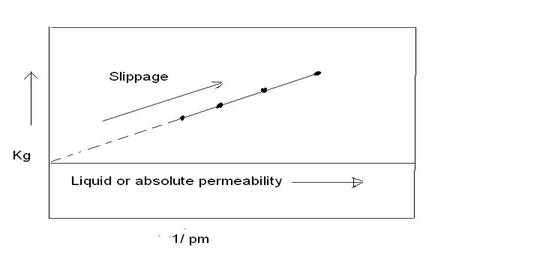Assignment Help With The Klinkenberg Effect
The Klinkenberg Effect
Klinkenberg (1941) discovered that permeability measurements made with air as the flowing fluid showed different results from permeability measurements made with a liquid as the flowing fluid. The permeability of a core sample measured by flowing air is always greater than the permeability obtained when a liquid is the flowing fluid. Klinkenberg postulated, on the basis of his laboratory experiments, that liquids had a zero velocity at the sand grain surface, while gases exhibited some finite velocity at the sand grain surface. In other words, the gases exhibited slippage at the sand grain surface. This slippage resulted in a higher flow rate for the gas at a given pressure differential. Klinkenberg also found that for a given porous medium as the mean pressure increased the calculated permeability decreased. Mean pressure is defined as upstream flowing plus downstream flowing pressure divided by two, [pm = (p1 + p2)/2]. If a plot of measured permeability versus 1/pm were extrapolated to the point where 1/pm = 0, in other words, where pm = infinity, this permeability would be approximately equal to the liquid permeability. A graph of this nature is shown in Figure 2. The absolute permeability is determined by extrapolation as shown in Figure 2.The resulting straight-line relationship can be expressed as
Mean pressure is defined as upstream flowing plus downstream flowing pressure divided by two, [pm = (p1 + p2)/2]. If a plot of measured permeability versus 1/pm were extrapolated to the point where 1/pm = 0, in other words, where pm = infinity, this permeability would be approximately equal to the liquid permeability. A graph of this nature is shown in Figure 2. The absolute permeability is determined by extrapolation as shown in Figure 2.The resulting straight-line relationship can be expressed as
Kg = Kl + c [ 1/pm]
Where kg = measured gas permeability
Pm = mean pressure
kL = equivalent liquid permeability, i.e., absolute permeability, k
c = slope of the line

Fig. The Klinkenberg effect in gas permeability measurements
Email Based Assignment Help in The Klinkenberg Effect
To submit The Klinkenberg Effect assignment click here.
Following are some of the topics in General Composition Of Petroleum in which we provide help:
- General Composition Of Petroleum
- Physical Properties Of Hydrocarbons
- Origin of Petroleum
- Fundamental properties Of Fluid Permeated Rocks
- Porosity
- Permeability
- The Klinkenberg Effect
- Saturation
- Wettability
- Capillary Pressure
- Relative Permeability
- Drainage Process
- Three phase Relative Permeability
- Rock Compressibility
- Fundamentals Of Reservoir Fluid Behavior
- Classification Of Reservoir And Reservoir Fluids
- Gas Reservoirs
- Fundamentals Of Reservoir Fluid Flow
- Types Of Fluids
- Properties Of natural Gases
- Behavior Of Ideal Gases
- Behavior of Real Gases
- Compressibility Of Natural Gases
- Properties Of Crude Oil Systems
- Gas Solubility
- Determination And Application of Reservoir Fluid Properties
- Composition Of The Reservoir Fluid
- Differential Liberation Test
- Separator Tests
- Fluid Analysis Data On Gas
- Constant-Volume Depletion
- Oil Recovery mechanisms And The material Balance Equation
- Primary Recovery Mechanisms
- The Depletion Drive Mechanism
- Gas Cap Drive
- The Water Drive Mechanism
- Water Production
- The Gravity-Drainage-Drive Mechanism
- The Combination-Drive Mechanism
- The Material Balance Equation
- Change in Pore Volume Due to Initial Water and Rock Expansion
- Gas Reservoirs Help
- The Volumetric Method
- The material Balance Method
Petroleum Engineering | Petroleum Engineering Courses | Rotary Drilling | Gas Reservoirs | Behavior Of Ideal Gases | Online Tutoring


